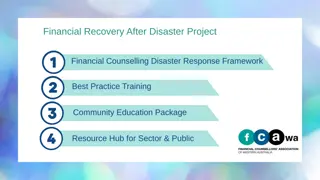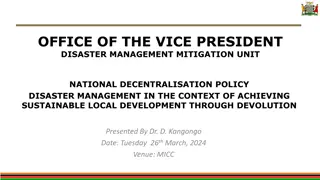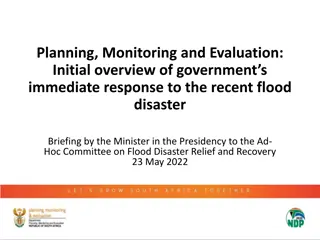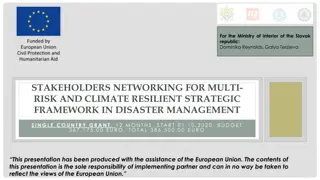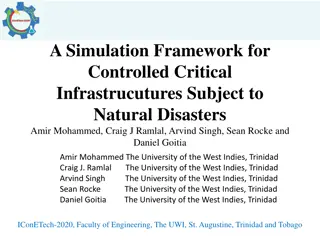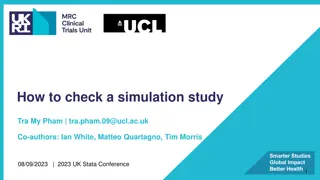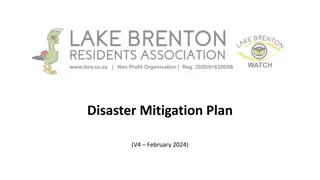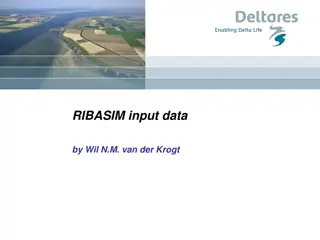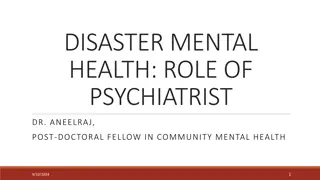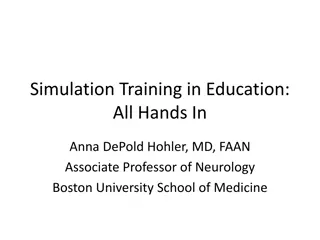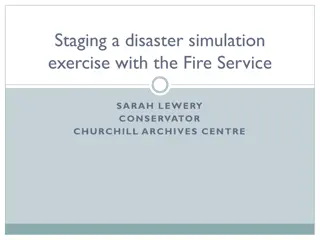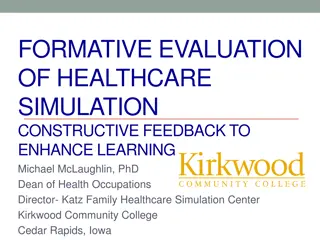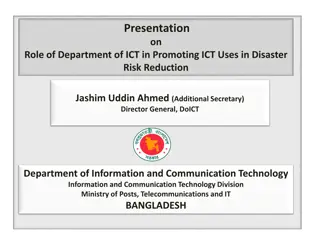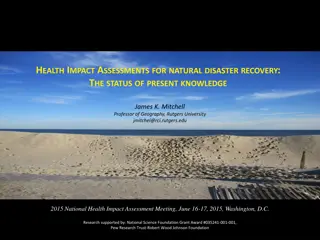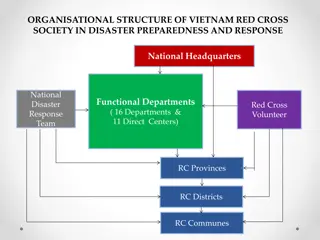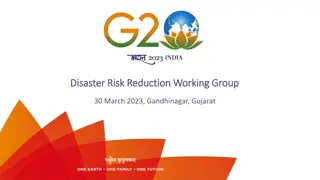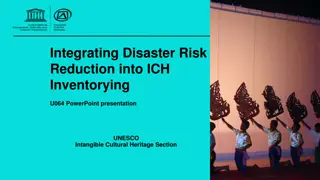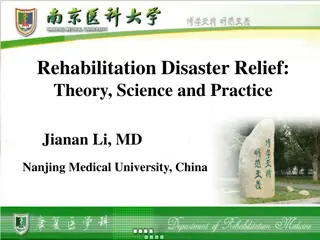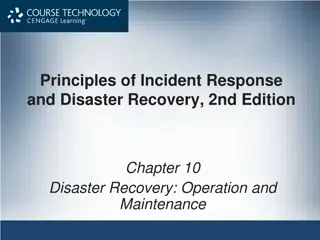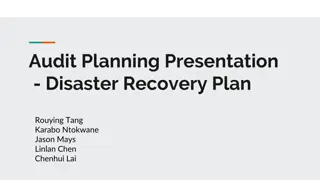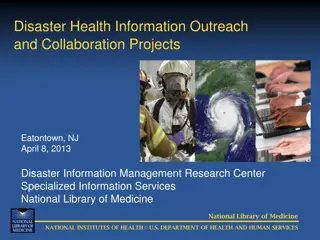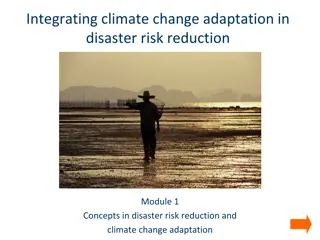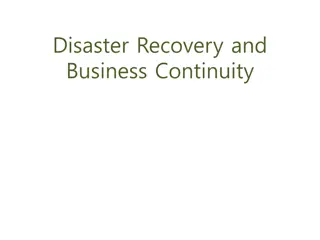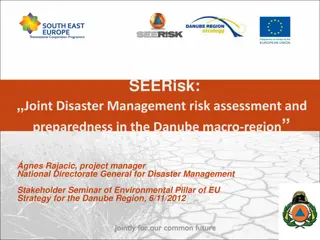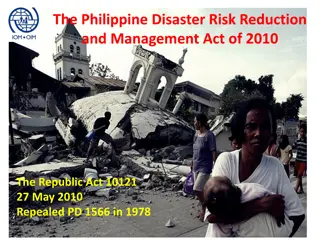International experience in the field of Disaster-related Statistics
Disaster-related statistics encompass data on disaster occurrences, impacts, risk assessment, and post-disaster assessments. The Sendai Framework for Disaster Risk Reduction and the 2030 Agenda for Sustainable Development set global targets and indicators for monitoring disaster risk reduction. Vari
7 views • 6 slides
Understanding Disaster Management Cycle and Phases
Disaster management encompasses planning, organizing, and implementing measures to prevent, reduce, and respond to disasters effectively. The disaster management cycle includes phases such as mitigation, preparedness, response, and recovery. The aim is to reduce potential losses, provide assistance
4 views • 15 slides
Disaster Management and Local Development Through Devolution
The presentation outlined the importance of disaster management in the context of achieving sustainable local development through devolution. It emphasized the need for effective subnational planning, mainstreaming of disaster risk reduction, and financing for disaster relief. The concept of devolut
5 views • 21 slides
Financial Recovery After Disaster Project: Comprehensive Framework for Community Resilience
This project focuses on financial recovery after disasters through financial counseling, disaster response frameworks, best practice training, and community education resources. It emphasizes understanding disaster risk governance, fostering individual responsibility, and identifying community champ
6 views • 5 slides
System Modeling and Simulation Course Overview
This course covers the basics of systems modeling, discrete-event simulation, and computer systems performance evaluation. Topics include Monte Carlo simulation, probability models, simulation output analysis, queueing theory, and more. Professor Carey Williamson leads the course with a focus on pra
4 views • 21 slides
Disaster Management and Sustainable Local Development Through Devolution
The presentation explores the integration of disaster management into subnational planning for achieving sustainable local development through devolution. It emphasizes the importance of decentralization, mainstreaming disaster risk reduction, urban areas' resilience, and financing for disaster reli
3 views • 21 slides
Overview of Army Modeling and Simulation Office
The U.S. Army Modeling and Simulation Office (AMSO) serves as the lead activity in developing strategy and policy for the Army Modeling and Simulation Enterprise. It focuses on effective governance, resource management, coordination across various community areas, and training the Army Analysis, Mod
1 views • 8 slides
Disaster Resilience Strategy in Developing Countries Vulnerable to Natural Disasters
The IMF's policy paper highlights key challenges faced by small states in building resilience, such as under-investment and donor support post-disaster rather than pre-disaster. The Disaster Resilience Strategy (DRS) emphasizes three pillars for intervention: post-disaster resilience, financial resi
0 views • 11 slides
Government's Immediate Response to Recent Flood Disaster: Overview and Assessment
Understanding the background and context of the recent flood disaster in KwaZulu-Natal (KZN) and other affected areas, this briefing outlines the government's quick response, including the declaration of a national state of disaster, coordination efforts, and actions taken by various government bodi
1 views • 35 slides
Stakeholders Networking for Multi-Risk and Climate Resilient Disaster Management in Slovakia
This project, funded by the European Union, aims to enhance emergency preparedness and response in Slovakia by addressing institutional capacity, coordination, and technology gaps. The goal is to strengthen risk assessment methodologies, involve various stakeholders, and develop disaster-resilient m
1 views • 5 slides
Simulation Framework for Controlled Critical Infrastructures Subject to Natural Disasters
This research project focuses on developing a Simulation Framework, utilizing the I2Sim toolbox, to assess the impact of natural disasters on critical infrastructures. The framework includes creating a simulated disaster test environment, designing testing procedures to analyze disaster effects, dev
1 views • 19 slides
How to Check a Simulation Study: Methods and Considerations
Simulation studies are often used to evaluate statistical methods and study power, but they can sometimes produce misleading results. This work discusses strategies to assess and improve the quality of simulation studies, drawing on experiences and considerations outlined in relevant literature. A s
0 views • 31 slides
System Modeling and Simulation Overview
This content provides insights into CPSC 531: System Modeling and Simulation course, covering topics such as performance evaluation, simulation modeling, and terminology in system modeling. It emphasizes the importance of developing simulation programs, advantages of simulation, and key concepts lik
0 views • 28 slides
Lake Brenton Disaster Mitigation Plan Overview
The Lake Brenton Residents Association plays a crucial role in disaster response with defined responsibilities including being the first responder, securing the area, and coordinating with authorities. The Disaster Mitigation Plan for Lake Brenton outlines roles, organizational structure, procedures
1 views • 20 slides
Basin Manipulation Simulation Analysis Tool Overview
Basin Manipulation Simulation Analysis Tool provides a comprehensive solution for managing and analyzing basin data, including tasks like basin manipulation, simulation analysis, case management, and defining simulation time steps. The tool allows for easy data entry, visualization of simulation res
2 views • 17 slides
Understanding the Role of Psychiatrists in Disaster Mental Health
Disaster mental health involves applying psychiatric skills to aid individuals and communities in recovering from the psychological effects of disasters. This includes readiness, response, relief, rehabilitation, recovery, and resilience phases. Mental health professionals play a crucial role in ide
0 views • 30 slides
Simulation Training in Education: Enhancing Learning Through Hands-On Simulation
Hands-on simulation training in education provides students with valuable learning experiences by increasing self-reported knowledge and technical proficiency. Simulations help improve students' knowledge, experience, and comfort with challenging procedures in a lower-risk environment, leading to en
0 views • 13 slides
Understanding Computer Simulation and Modeling Tools
Computer simulation and modeling is essential for conducting studies in various fields. Selecting the right simulation language or package is crucial for accurate results. This involves considering the characteristics of the language, such as random number generation, process transformers, list proc
0 views • 7 slides
Disaster Simulation Exercise with the Fire Service at Churchill Archives Centre
Disaster simulation exercises were conducted at Churchill Archives Centre to test the Disaster Contingency Plan. Lessons were learned from previous exercises, leading to improvements in procedures and equipment. Preparation included consultation with the Fire Service and a detailed risk assessment.
0 views • 18 slides
Advanced Beam Dynamics and Machine Protection in High-Energy Linacs
Overview of recent talks and discussions at LCWS 2014 in Belgrade, Serbia, focusing on machine protection, simulation codes, instrumentation, and system tests. Topics include beam-loss monitors, dark current measurements, simulation code developments, and beam dynamics studies in linacs. Key speaker
0 views • 12 slides
Enhancing Healthcare Simulation Through Constructive Feedback
Explore the principles and benefits of healthcare simulation, focusing on formative evaluation and constructive feedback to improve learning outcomes. Delve into the role of formative assessment tools, TeamSTEPPS model, and Mayo High Performance Teamwork Scale in simulation scenarios. Discover the s
0 views • 37 slides
Role of Department of ICT in Disaster Risk Reduction in Bangladesh
The Department of Information and Communication Technology (ICT) in Bangladesh plays a crucial role in promoting the use of ICT for disaster risk reduction. Bangladesh faces numerous catastrophic hazards, making it essential to utilize ICT for warning systems, relief management, and post-disaster ac
0 views • 16 slides
Health Impact Assessments for Natural Disaster Recovery
The study examines the status of knowledge related to health impact assessments for natural disaster recovery, emphasizing the importance of considering the long-term health impacts of disasters. It highlights how disasters and recovery actions can have lasting consequences on community health and w
0 views • 10 slides
Organisational Structure of Vietnam Red Cross Society in Disaster Preparedness and Response
The Vietnam Red Cross Society has a structured organizational setup for disaster preparedness and response, including the National Headquarters, Disaster Management Department, and various functional departments at different levels. The organization has achieved significant results in disaster manag
0 views • 6 slides
Global Initiatives for Disaster Risk Reduction in Gandhinagar
The Disaster Risk Reduction Working Group (DRRWG) in Gandhinagar, Gujarat, is focusing on priorities such as early warning systems, resilient infrastructure, financing, disaster response, and recovery. There is a strong emphasis on the connection between disaster risk reduction and sustainable devel
0 views • 18 slides
Integrating Disaster Risk Reduction into ICH Inventorying for UNESCO
Learn how to apply a community-based approach to inventorying and safeguarding intangible cultural heritage within the context of disasters. This presentation offers frameworks, tools, and exercises to integrate disaster awareness into ICH inventorying and safeguarding practices, emphasizing the imp
0 views • 15 slides
Rehabilitation Disaster Relief: Theory, Science, and Practice
Challenges in Rehabilitation Disaster Relief include lack of extensive rescue capacity, rehab resources and management, fund shortages, and uncoordinated implementation. ISPRM-RDRC outlines past and future actions focusing on the NHV model, mobile rehab teams, international rehab databases, rehab st
0 views • 21 slides
Disaster Recovery Operations and Maintenance Overview
Organizations face key challenges in disaster recovery operations, such as widespread disruptions affecting various levels, communities, and suppliers. Prompt reactions and preparedness are essential to navigate through the phases of a disaster recovery plan - preparation, response, recovery, resump
0 views • 48 slides
Introduction to VLSI CAD and Discrete-Event Simulation at Tufts University
This course introduces students to event-oriented simulation, building virtual models, and validating designs through simulation. It covers the importance of simulation in testing and refining designs before implementation. Examples include simulating VLSI networks and exploring the use of discrete-
0 views • 32 slides
Building Research Team for Disaster and Funding in Resource-Poor Settings
Disaster research team building is essential for effective disaster management in resource-poor settings. Dr. Onyeaghala emphasized the importance of competent teams in mitigating, preventing, managing, and monitoring health disasters. The workshop in Abuja highlighted the critical competencies and
0 views • 24 slides
Disaster Recovery Plan Audit for Berry College
Berry College's Information Technology Disaster Recovery Plan is a vital strategy to ensure the continuity of IT operations in the event of a disaster. This audit plan presentation outlines the objectives, scope, and responsibilities involved in auditing and maintaining the effectiveness of the disa
0 views • 20 slides
The Right Way to Code Simulation Studies in Stata
Simulation studies in Stata involve using (pseudo) random numbers to generate data from a distribution for studying statistical methods. This process helps to evaluate different scenarios and understand the properties of statistical techniques. Key components like ADEMP (Aims, Data-generating mechan
1 views • 18 slides
Simulation Results for LC-Optimized PHY Proposal in July 2019
The document presents simulation results for an LC-optimized PHY proposal for TGbb based on G.9991 PHY. It includes details on the simulation setup, frame detection results, header modulation, coding simulation results, payload modulation, and coding simulation results. The setup involved various re
0 views • 18 slides
Disaster Health Information Outreach and Collaboration Projects: Enhancing Disaster Preparedness
This project by the National Library of Medicine aims to improve access to disaster medicine and public health information for the disaster health workforce through partnerships with various organizations across the United States. Seven projects are awarded annually, focusing on enhancing disaster p
0 views • 15 slides
Integrating Climate Change Adaptation in Disaster Risk Reduction Module 1
Welcome to the e-Learning module on integrating climate change adaptation in disaster risk reduction. This module covers concepts in disaster risk reduction and climate change adaptation. It is part of a package that includes five modules focusing on vulnerability, disaster risk reduction, climate c
0 views • 29 slides
Supporting Emotional Well-being in Disaster Survivors: Resources and Training
Explore resources from the Missouri Department of Mental Health for providing emotional care to disaster survivors. Learn about stress responses, training programs like Psychological First Aid, and access web resources for disaster readiness. Contact Jenny Wiley, Coordinator of Disaster Services, fo
0 views • 8 slides
Importance of Disaster Recovery and Business Continuity Planning
Disaster recovery and business continuity planning are crucial for businesses to survive major disasters and continue operations. This involves assessing business impacts, creating documentation, and planning for various types of disasters. Failure to plan can lead to significant revenue loss, damag
0 views • 46 slides
Understanding SBA Disaster Loans for New Castle County, DE
Explore the role of the Small Business Administration in disaster recovery through its loan programs for businesses, homeowners, and renters in New Castle County, DE. Learn about the types of SBA disaster declarations, loan programs offered, limits on loan amounts, and details of the recent New Jers
0 views • 20 slides
SEERisk: Disaster Management and Preparedness in the Danube Macro-Region
Joint Disaster Management project SEERisk aimed to assess and enhance preparedness in the Danube macro-region, involving multiple stakeholders in environmental disaster risk reduction. The project, led by gnes Rajacic, Project Manager at the National Directorate General for Disaster Management, focu
0 views • 17 slides
Enhancing Disaster Risk Reduction in the Philippines
The Philippine Disaster Risk Reduction and Management Act of 2010, also known as Republic Act 10121, replaced PD 1566 and introduced a proactive approach to disaster management, focusing on risk reduction and building community resilience. The new law aims to transform and reform disaster response b
0 views • 26 slides



